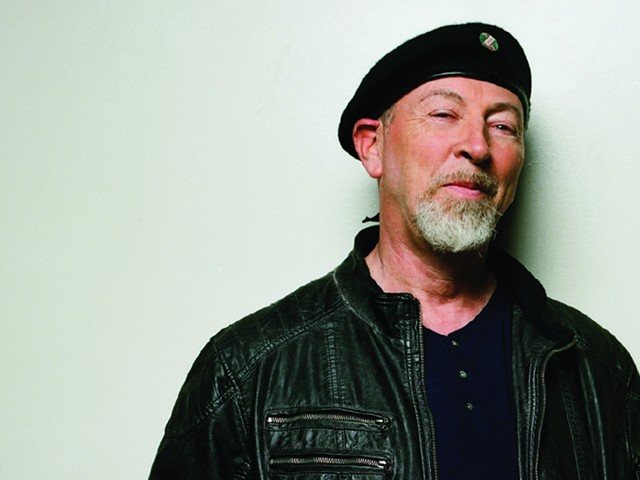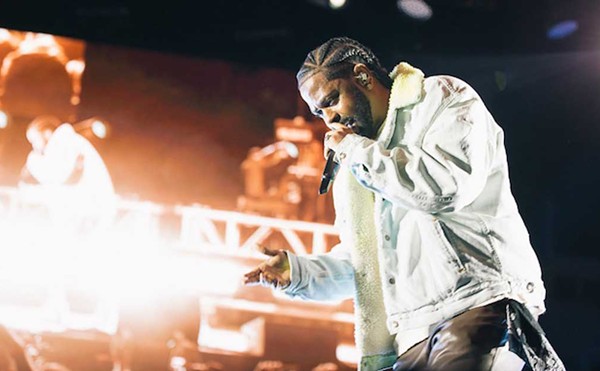For 25 years, Soiree Records has been “housing under the radar,” founder Derrick Thompson’s clever turn of phrase for his low-key, yet ever-expanding repertoire of deep house grooves and late night electronic body music. Thompson founded the label in 1990 at a seminal moment for Detroit, amid basement and warehouse raves, analog synthesis, turntablism, and a deep reverence for the vinyl format. And while many electro labels faded with the moment, Thompson persevered to curate a sound culled from anything from house and techno to downtempo and experimental, so long as it was “authentic and intelligent.”
This weekend, Soiree will celebrate its 25th anniversary at Motor City Wine Bar with live performances by Thompson, aka Drivetrain and Scott Grooves. For now, peep Metro Times’ chat with Thompson about keeping it real through hard times, holey jeans, and an oatmeal diet to the daily operations of a hard-won Detroit institution.
Metro Times: Soiree Records International started in 1990. What was the electronic music scene like in the Detroit at that time? Derrick Thompson: At that time, Detroit was beginning to be recognized globally as the home and birthplace of techno music. Detroit producers were sought after by labels and clubs everywhere. But at the same time, these producers were hardly known in their hometown. Electronic music locally was very underground, and there were only a handful of venues in which you could hear it played properly.
MT: What's the founding story behind Soiree?
Thompson: I was a big fan of electronic music at the time. I had been DJing at private parties, usually house music and some techno. I was also a musician playing mostly alternative/indie music. I played guitar, bass, keyboard programming, as well as sang. After shopping many of my projects around to major labels only to be denied, I felt it was time to take my music career into my own hands — thus, the birth of Soiree Records International. The name comes from a Monday night party series held at my house; we called the parties "soirees." It was nothing special. Just a bunch of kids doing ridiculously wild, kid stuff. It seemed like the right name for the label.
I knew there would be incredible hurdles to jump. In those days, there were no "digital download" websites. If you wanted to sell your product, you had to spend a significantly large amount of money to have your music pressed on vinyl, or compact disc. Most DJs were using vinyl records, so that was my media of choice. The artwork, mastering, plating, and pressing required was financed by my day job. I had no problem investing whatever it took, as I was determined to make the label work. It didn't take long for me to get used to holey jeans and an oatmeal diet.
For the first release, I produced all of the music and collaborated with my girlfriend at the time on the vocals. I was not happy with the sound quality on the pressing, however. But I learned a lot from the experience about the mastering process.
Another huge challenge was promoting and distributing the label. After weeks of research and phone calls I landed deals with several distributors. But I still needed a promotional machine. This aspect of the business was more a trial and error episode for me. I was ripped off by music sharks who I paid to promote, but after they got their money, they were outta sight outta mind. It became more and more obvious to me that this endeavor would take a lot of patience, perseverance, and money. But I stuck with it.
MT: How did the label intersect with your own solo career?
Thompson: The label provided a means for getting my sound exposed. I produced music and personas without any limits. I was recording and DJing under the moniker, Drivetrain (I still use that today, among others.) I would shop and distribute my product to a global market with total control of my musical destiny. Producing electronic music typically enhances or even launches a DJ career. In my case, my DJ profile was already starting to take off. With the added boost from the label, it wasn't long before I was DJing in in clubs all over the country and even overseas. Many other artists on the label have enjoyed the same benefits.
MT: What were some of your early musical influences?
Thompson: Very early electronic influences include Kraftwerk, Afrika Bambaataa, Cybotron. I was also inspired by disco composers like Giorgio Moroder, Gino Soccio, Nile Rodgers, and Bernard Edwards. But even before them, my musical foundation was formed playing guitar and bass. Many of my earliest influences were rock/metal bands and jazz musicians — Joe Satriani, Jimi Hendrix, and Jaco Pastorius. This early education in music theory continues to pay off in my productions today with melodic structure and chord progression. Often I'll fuse live instrumentation with electronics, which takes the sound to a new dimension.
MT: What's it like running Soiree on the daily?
Thompson: Early on, I realized that being label owner requires a lot more than just making music. I'm very serious about pushing my music and the music of those who I represent. Management and promotion in itself is a full-time job. Because of this enormous responsibility, I've brought on professional promotional organizations to assist in providing our well-deserved publicity and support.
MT: Soiree Records has a varied repertoire of releases. Looking back, what were some of the releases you are most proud of, or which came to define the label?
Thompson: In the early days, Soiree released a mixture of house and techno. The ground-breaking Lockstep EP, released in 1992, has sold more vinyl copies than any other on the label. Then in 1994, Scott Grooves (who now run his own label, Natural Midi) and I established the deep house sound of Soiree, beginning with the Key Statements EP. The Deep Animation EP of 1994 found a home on the cover of DJ Times magazine in the hands of House legend Tony Humphries. In the years to follow, artists from around the world began submitting some amazing music.
Many of these tracks were released on a compilation series called Colours. Then in the early 2000s vinyl sales began to tank because of the rise of the digital download market. Like many labels at the time, Soiree struggled to reinvent itself in an MP3 world. Today, all of our music is released on both vinyl and digital formats. Since 2009 we've released many four-artist compilations — this has become a huge staple of our catalog. Now, I'm very excited about the Clockwerk EP, just released last month.
MT: Who are some favorite Detroit based electronic producers you've collaborated with?
Thompson: I enjoyed working with Scott Grooves in the early days. Since then most of my productions have been solo. But I've had amazing sessions with Jerry the Cat (from Detroit but now living in Lisbon, Portugal). And most recently, J. Garcia and I have collaborated on projects under the name Woodward & Jefferson.
MT: What does it mean to have Soiree evolve and grow in Detroit?
Thompson: I'm very proud that Soiree has participated in the musical legacy of Detroit — a city with a rich history of music discovery, innovation, and development that continues to motivate and inspire people around the world.
MT: And what are your thoughts on the electronic music scene in Detroit today?
Thompson: The electronic music scene has expanded to include many forms, most of which are commercial and easily accessible. There are still places where you can enjoy genuine electronic music of different styles. But these places are few and far between, and unfortunately, many times they are not well supported.
MT: What can we look forward to from Soiree in 2016 and beyond? Any new artists you are excited about?
Thompson: In the coming year, our goal is to release more frequently. We would also like to sponsor more international promotional events. But most importantly, we will stay true to our roots, producing, supporting, and releasing only legitimate, real music.
Celebrate Soiree Records' 25th anniversary at Motor City Wine Bar on Saturday, Dec. 12 with performances by Scott Grooves and Derrick Thompson (Drivetrain) with T-shirts, CDs, vinyl for sale, and complimentary wine. Starts at 10 p.m.; 1949 Michigan Ave., Detroit; free admission; 21 and older.





